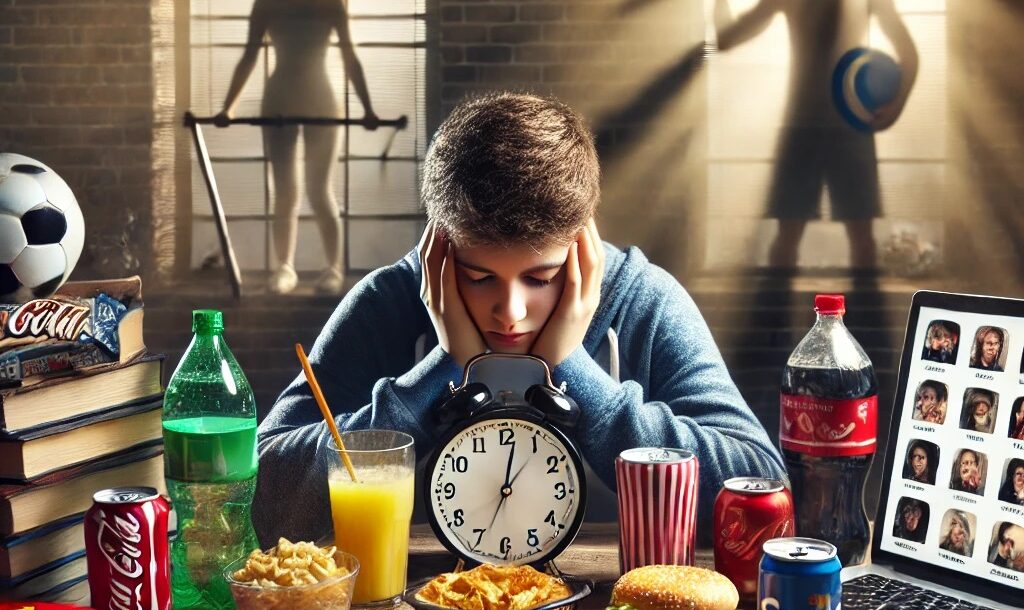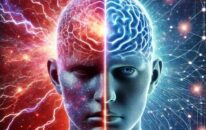Adolescent Brain Enemies: What You Should Know
Adolescence is a crucial stage in life during which the brain undergoes significant transformations. However, certain factors can disrupt this development, impacting mental and physical health. Here, we explore the main challenges to the adolescent brain and provide clear examples and strategies to address them.
1️⃣ Chronic Stress
Chronic stress raises cortisol levels, which can negatively impact key areas of the brain:
- Hippocampus: Reduces memory and learning capacity.
- Amygdala: Becomes overactive, increasing anxiety and emotional overreactions.
- Prefrontal Cortex: Impairs decision-making and self-control.
Example: A teenager constantly stressed about academic demands might forget simple tasks or react aggressively to criticism.
Strategies: Create a supportive home environment by dedicating daily time to listening without judgment. Activities like yoga or breathing exercises can help manage stress. If the situation persists, consider seeking professional counseling.
2️⃣ Sleep Deprivation
Teenagers require 8 to 10 hours of sleep for optimal brain development. Sleep deprivation affects emotional regulation and academic performance.
Example: A teenager who sleeps only 5 hours due to time spent on social media might become irritable, forget key details for a test, and perform poorly in sports.
Strategies: Establish consistent bed and wake-up times. Limit screen use at least an hour before bedtime and create a calm, distraction-free sleep environment.
3️⃣ Excessive Screen Time
Too much screen time can disrupt sleep quality and alter the brain’s reward system, making activities like reading, sports, or face-to-face socializing less appealing.
Example: A teenager spending six hours a day gaming might lose interest in social interactions or schoolwork, showing signs of apathy and dependency on technology.
Strategies: Set clear screen time limits. Offer engaging alternatives like creative workshops, sports, or family activities. Model healthy device usage yourself.
4️⃣ Psychoactive Substances
Using alcohol, tobacco, or drugs can permanently alter brain development and increase the risk of long-term addiction.
Example: A teenager experimenting with alcohol at social events might experience mood swings, memory loss, or impulsive behavior.
Strategies: Have honest, open conversations about the risks. Share real-life examples of how substance use can derail personal goals, such as academic or athletic achievements.
5️⃣ Poor Diet
A diet high in refined sugars and trans fats can negatively affect hormonal balance and brain function, impairing memory and focus.
Example: A teenager who has sugary cereal and soda for breakfast might feel tired and struggle to concentrate in morning classes.
Strategies: Encourage balanced meals at home with fruits, nuts, and lean proteins. Cooking together can be a fun way to teach healthy eating habits.
6️⃣ Lack of Physical Activity
Exercise promotes the release of neurotransmitters like BDNF, which is crucial for neuroplasticity, and enhances emotional regulation.
Example: A sedentary teenager may feel unmotivated, have low energy, and experience more frequent sadness.
Strategies: Sign them up for activities they enjoy, like dance, soccer, or hiking. Exercising as a family can also be a great motivator and strengthen bonds.
7️⃣ Negative Social Environments
Toxic environments, such as bullying or frequent family conflicts, damage self-esteem and make emotional regulation more difficult.
Example: A teenager experiencing bullying at school might withdraw socially, avoid activities, and show signs of anxiety or depression.
Strategies: Actively listen to their concerns and boost their self-esteem with positive reinforcement. Communicate with teachers or community leaders to identify and address social challenges.
Did you know these factors impact the adolescent brain? Understanding and addressing these challenges can profoundly affect their development and well-being. What strategies do you use to help teenagers overcome these obstacles?
Source: AI-generated research
Jorge Entique Gutiérrez Guillén




